|

Black-necked cranes are pictured at Yunnan Dashanbao National Nature Reserve for Black-necked Cranes in Zhaotong, southwest China's Yunnan Province, Dec. 11, 2022. Yunnan Dashanbao National Nature Reserve for Black-necked Cranes, located in Zhaoyang District of Zhaotong City, is the most significant wintering habitat and transfer station for migratory black-necked cranes on the Yunnan-Guizhou Plateau. Chen Guanghui, 38, has been dedicated to the protection work of black-necked cranes at the reserve since 2003. She made a special whistle sound to communicate with the birds. Every year, once the black-necked cranes flock to the reserve during their migration, Chen spends hours every day feeding the birds, observing their activities and patrolling. "I regard black-necked cranes as my family," said Chen Guanghui. "I feel a deep sense of loss when they leave in the spring." Over recent years, the reserve has made a determined effort to implement conservation measures, such as wetland protection and restoration and construction of food source bases, in order to steadily improve its ecological environment for migratory birds. During the past three years, an average of over 1,500 black-necked cranes were spotted arriving at the reserve for wintering. (Xinhua/Wang Guansen) 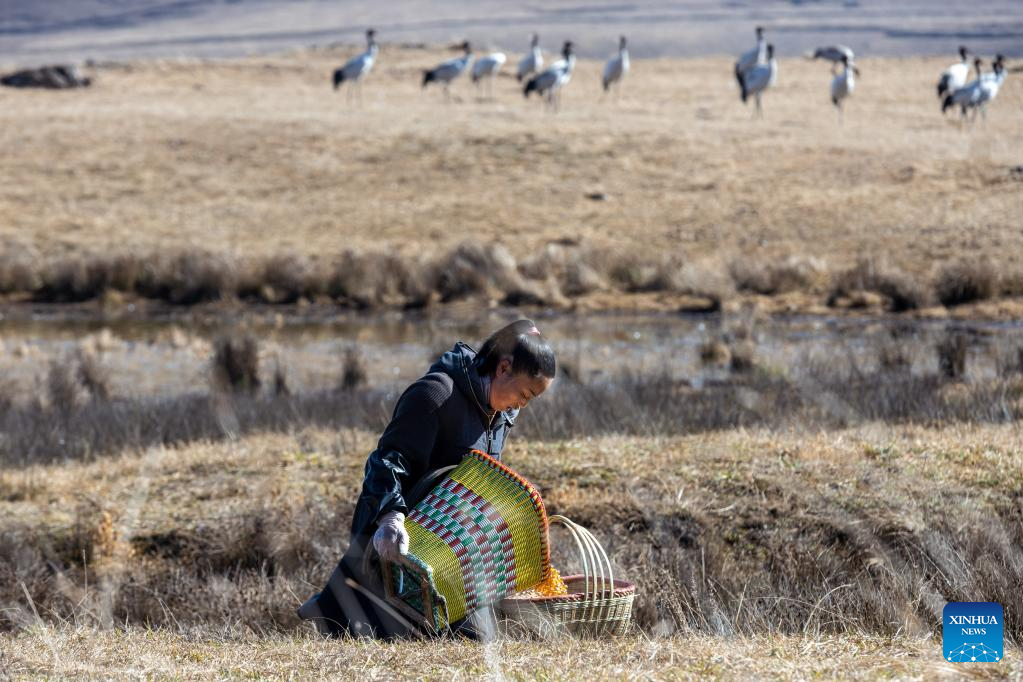
Chen Guanghui prepares to feed black-necked cranes at Yunnan Dashanbao National Nature Reserve for Black-necked Cranes in Zhaotong, southwest China's Yunnan Province, Dec. 11, 2022. Yunnan Dashanbao National Nature Reserve for Black-necked Cranes, located in Zhaoyang District of Zhaotong City, is the most significant wintering habitat and transfer station for migratory black-necked cranes on the Yunnan-Guizhou Plateau. Chen Guanghui, 38, has been dedicated to the protection work of black-necked cranes at the reserve since 2003. She made a special whistle sound to communicate with the birds. Every year, once the black-necked cranes flock to the reserve during their migration, Chen spends hours every day feeding the birds, observing their activities and patrolling. "I regard black-necked cranes as my family," said Chen Guanghui. "I feel a deep sense of loss when they leave in the spring." Over recent years, the reserve has made a determined effort to implement conservation measures, such as wetland protection and restoration and construction of food source bases, in order to steadily improve its ecological environment for migratory birds. During the past three years, an average of over 1,500 black-necked cranes were spotted arriving at the reserve for wintering. (Xinhua/Cao Mengyao) 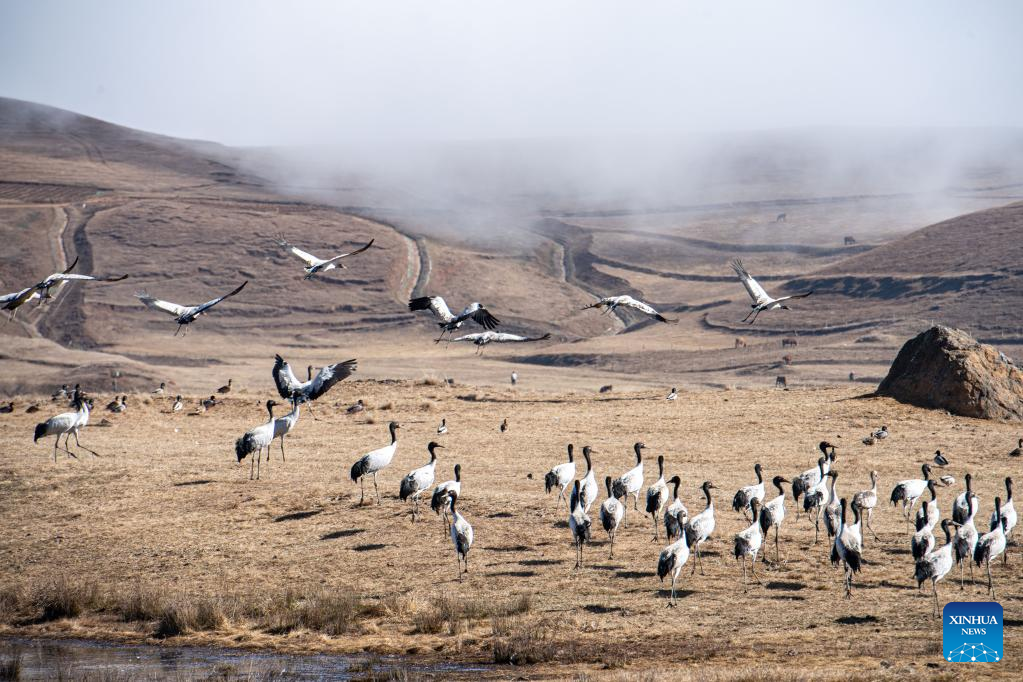
Black-necked cranes are pictured at Yunnan Dashanbao National Nature Reserve for Black-necked Cranes in Zhaotong, southwest China's Yunnan Province, Dec. 11, 2022. Yunnan Dashanbao National Nature Reserve for Black-necked Cranes, located in Zhaoyang District of Zhaotong City, is the most significant wintering habitat and transfer station for migratory black-necked cranes on the Yunnan-Guizhou Plateau. Chen Guanghui, 38, has been dedicated to the protection work of black-necked cranes at the reserve since 2003. She made a special whistle sound to communicate with the birds. Every year, once the black-necked cranes flock to the reserve during their migration, Chen spends hours every day feeding the birds, observing their activities and patrolling. "I regard black-necked cranes as my family," said Chen Guanghui. "I feel a deep sense of loss when they leave in the spring." Over recent years, the reserve has made a determined effort to implement conservation measures, such as wetland protection and restoration and construction of food source bases, in order to steadily improve its ecological environment for migratory birds. During the past three years, an average of over 1,500 black-necked cranes were spotted arriving at the reserve for wintering. (Xinhua/Wang Guansen) 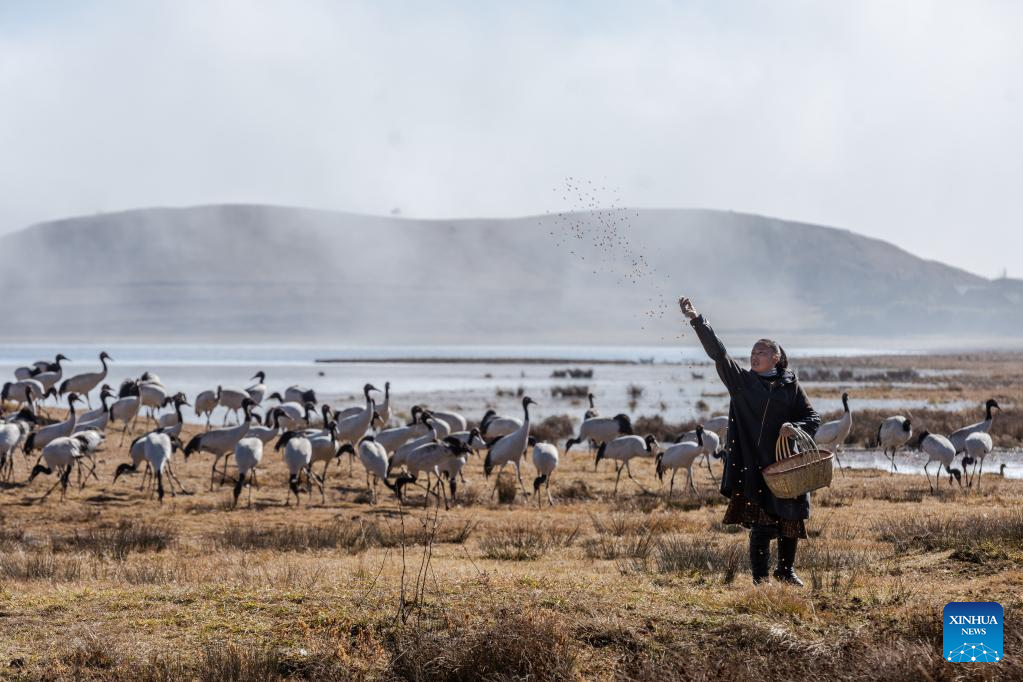
Chen Guanghui feeds black-necked cranes at Yunnan Dashanbao National Nature Reserve for Black-necked Cranes in Zhaotong, southwest China's Yunnan Province, Dec. 11, 2022. Yunnan Dashanbao National Nature Reserve for Black-necked Cranes, located in Zhaoyang District of Zhaotong City, is the most significant wintering habitat and transfer station for migratory black-necked cranes on the Yunnan-Guizhou Plateau. Chen Guanghui, 38, has been dedicated to the protection work of black-necked cranes at the reserve since 2003. She made a special whistle sound to communicate with the birds. Every year, once the black-necked cranes flock to the reserve during their migration, Chen spends hours every day feeding the birds, observing their activities and patrolling. "I regard black-necked cranes as my family," said Chen Guanghui. "I feel a deep sense of loss when they leave in the spring." Over recent years, the reserve has made a determined effort to implement conservation measures, such as wetland protection and restoration and construction of food source bases, in order to steadily improve its ecological environment for migratory birds. During the past three years, an average of over 1,500 black-necked cranes were spotted arriving at the reserve for wintering. (Xinhua/Cao Mengyao) 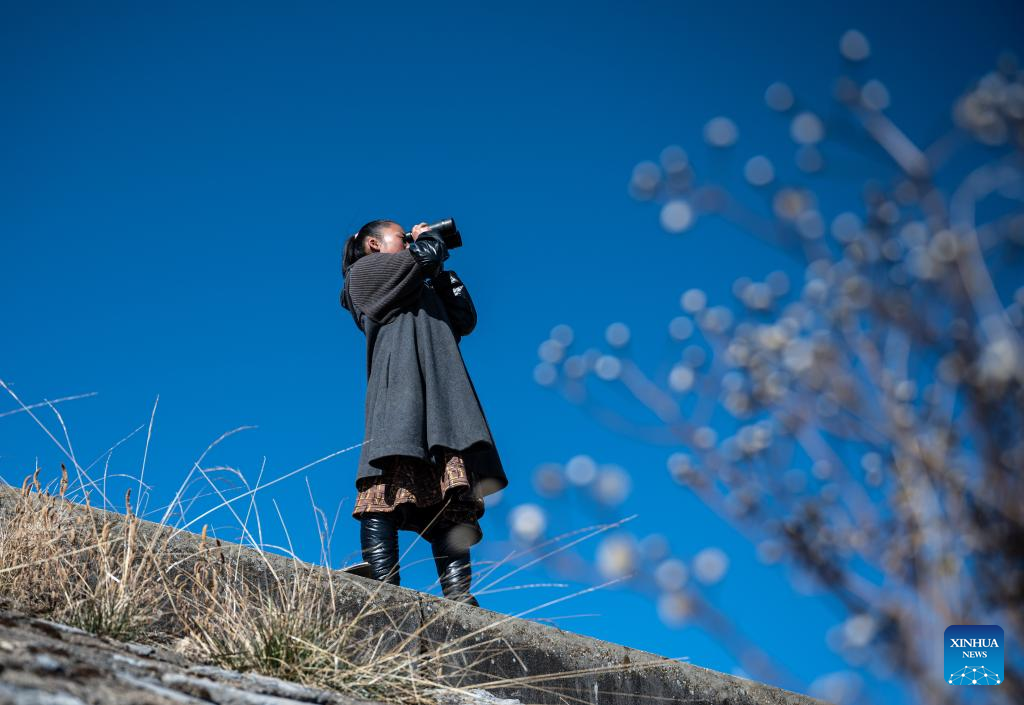
Chen Guanghui observes black-necked cranes at Yunnan Dashanbao National Nature Reserve for Black-necked Cranes in Zhaotong, southwest China's Yunnan Province, Dec. 11, 2022. Yunnan Dashanbao National Nature Reserve for Black-necked Cranes, located in Zhaoyang District of Zhaotong City, is the most significant wintering habitat and transfer station for migratory black-necked cranes on the Yunnan-Guizhou Plateau. Chen Guanghui, 38, has been dedicated to the protection work of black-necked cranes at the reserve since 2003. She made a special whistle sound to communicate with the birds. Every year, once the black-necked cranes flock to the reserve during their migration, Chen spends hours every day feeding the birds, observing their activities and patrolling. "I regard black-necked cranes as my family," said Chen Guanghui. "I feel a deep sense of loss when they leave in the spring." Over recent years, the reserve has made a determined effort to implement conservation measures, such as wetland protection and restoration and construction of food source bases, in order to steadily improve its ecological environment for migratory birds. During the past three years, an average of over 1,500 black-necked cranes were spotted arriving at the reserve for wintering. (Xinhua/Wang Guansen) 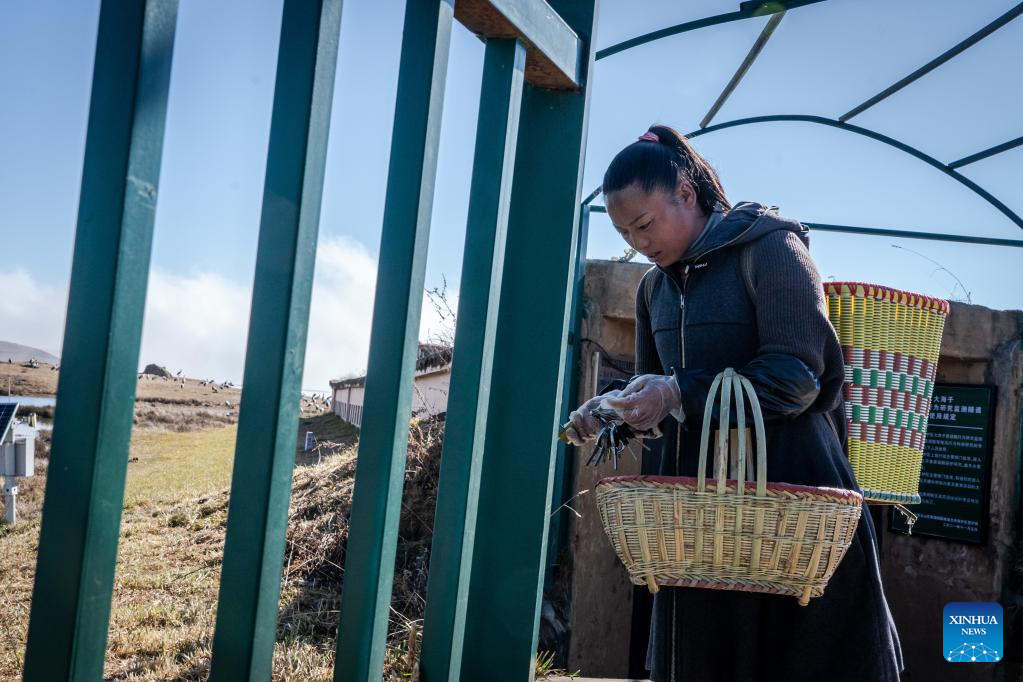
Chen Guanghui prepares to feed black-necked cranes at Yunnan Dashanbao National Nature Reserve for Black-necked Cranes in Zhaotong, southwest China's Yunnan Province, Dec. 11, 2022. Yunnan Dashanbao National Nature Reserve for Black-necked Cranes, located in Zhaoyang District of Zhaotong City, is the most significant wintering habitat and transfer station for migratory black-necked cranes on the Yunnan-Guizhou Plateau. Chen Guanghui, 38, has been dedicated to the protection work of black-necked cranes at the reserve since 2003. She made a special whistle sound to communicate with the birds. Every year, once the black-necked cranes flock to the reserve during their migration, Chen spends hours every day feeding the birds, observing their activities and patrolling. "I regard black-necked cranes as my family," said Chen Guanghui. "I feel a deep sense of loss when they leave in the spring." Over recent years, the reserve has made a determined effort to implement conservation measures, such as wetland protection and restoration and construction of food source bases, in order to steadily improve its ecological environment for migratory birds. During the past three years, an average of over 1,500 black-necked cranes were spotted arriving at the reserve for wintering. (Xinhua/Cao Mengyao) 
Black-necked cranes are pictured at Yunnan Dashanbao National Nature Reserve for Black-necked Cranes in Zhaotong, southwest China's Yunnan Province, Dec. 11, 2022. Yunnan Dashanbao National Nature Reserve for Black-necked Cranes, located in Zhaoyang District of Zhaotong City, is the most significant wintering habitat and transfer station for migratory black-necked cranes on the Yunnan-Guizhou Plateau. Chen Guanghui, 38, has been dedicated to the protection work of black-necked cranes at the reserve since 2003. She made a special whistle sound to communicate with the birds. Every year, once the black-necked cranes flock to the reserve during their migration, Chen spends hours every day feeding the birds, observing their activities and patrolling. "I regard black-necked cranes as my family," said Chen Guanghui. "I feel a deep sense of loss when they leave in the spring." Over recent years, the reserve has made a determined effort to implement conservation measures, such as wetland protection and restoration and construction of food source bases, in order to steadily improve its ecological environment for migratory birds. During the past three years, an average of over 1,500 black-necked cranes were spotted arriving at the reserve for wintering. (Xinhua/Cao Mengyao) 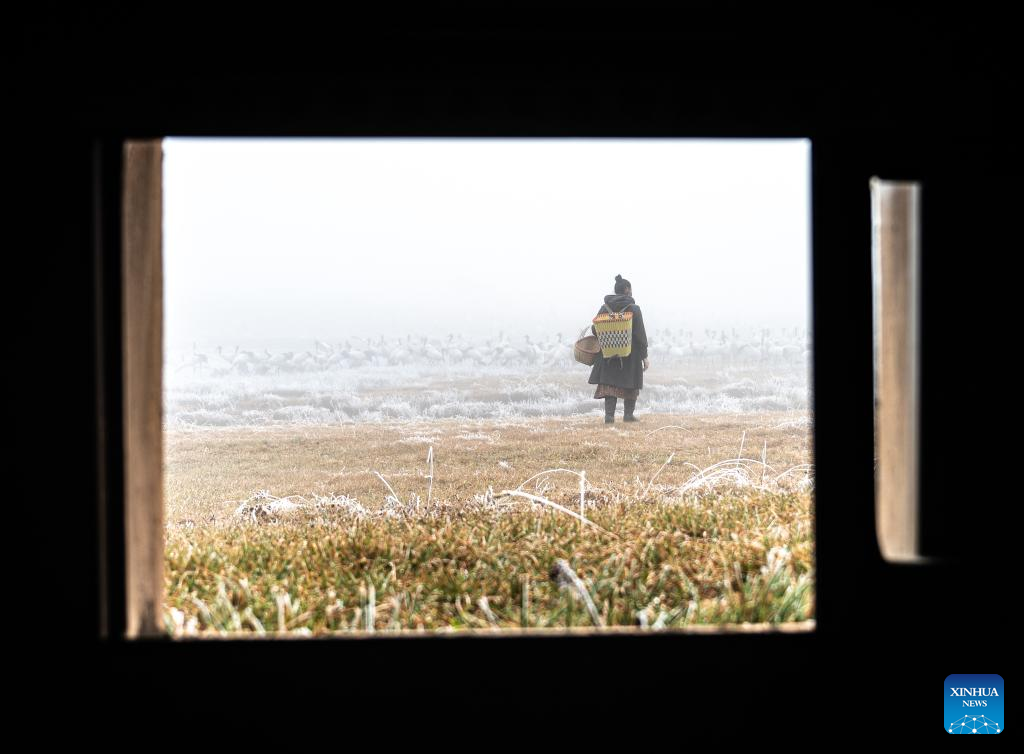
Chen Guanghui feeds black-necked cranes at Yunnan Dashanbao National Nature Reserve for Black-necked Cranes in Zhaotong, southwest China's Yunnan Province, Dec. 10, 2022. Yunnan Dashanbao National Nature Reserve for Black-necked Cranes, located in Zhaoyang District of Zhaotong City, is the most significant wintering habitat and transfer station for migratory black-necked cranes on the Yunnan-Guizhou Plateau. Chen Guanghui, 38, has been dedicated to the protection work of black-necked cranes at the reserve since 2003. She made a special whistle sound to communicate with the birds. Every year, once the black-necked cranes flock to the reserve during their migration, Chen spends hours every day feeding the birds, observing their activities and patrolling. "I regard black-necked cranes as my family," said Chen Guanghui. "I feel a deep sense of loss when they leave in the spring." Over recent years, the reserve has made a determined effort to implement conservation measures, such as wetland protection and restoration and construction of food source bases, in order to steadily improve its ecological environment for migratory birds. During the past three years, an average of over 1,500 black-necked cranes were spotted arriving at the reserve for wintering. (Xinhua/Wang Guansen) 
Black-necked cranes are pictured at Yunnan Dashanbao National Nature Reserve for Black-necked Cranes in Zhaotong, southwest China's Yunnan Province, Dec. 11, 2022. Yunnan Dashanbao National Nature Reserve for Black-necked Cranes, located in Zhaoyang District of Zhaotong City, is the most significant wintering habitat and transfer station for migratory black-necked cranes on the Yunnan-Guizhou Plateau. Chen Guanghui, 38, has been dedicated to the protection work of black-necked cranes at the reserve since 2003. She made a special whistle sound to communicate with the birds. Every year, once the black-necked cranes flock to the reserve during their migration, Chen spends hours every day feeding the birds, observing their activities and patrolling. "I regard black-necked cranes as my family," said Chen Guanghui. "I feel a deep sense of loss when they leave in the spring." Over recent years, the reserve has made a determined effort to implement conservation measures, such as wetland protection and restoration and construction of food source bases, in order to steadily improve its ecological environment for migratory birds. During the past three years, an average of over 1,500 black-necked cranes were spotted arriving at the reserve for wintering. (Xinhua/Cao Mengyao) 
Black-necked cranes are pictured at Yunnan Dashanbao National Nature Reserve for Black-necked Cranes in Zhaotong, southwest China's Yunnan Province, Dec. 11, 2022. Yunnan Dashanbao National Nature Reserve for Black-necked Cranes, located in Zhaoyang District of Zhaotong City, is the most significant wintering habitat and transfer station for migratory black-necked cranes on the Yunnan-Guizhou Plateau. Chen Guanghui, 38, has been dedicated to the protection work of black-necked cranes at the reserve since 2003. She made a special whistle sound to communicate with the birds. Every year, once the black-necked cranes flock to the reserve during their migration, Chen spends hours every day feeding the birds, observing their activities and patrolling. "I regard black-necked cranes as my family," said Chen Guanghui. "I feel a deep sense of loss when they leave in the spring." Over recent years, the reserve has made a determined effort to implement conservation measures, such as wetland protection and restoration and construction of food source bases, in order to steadily improve its ecological environment for migratory birds. During the past three years, an average of over 1,500 black-necked cranes were spotted arriving at the reserve for wintering. (Xinhua/Wang Guansen) 
Chen Guanghui prepares to feed black-necked cranes at Yunnan Dashanbao National Nature Reserve for Black-necked Cranes in Zhaotong, southwest China's Yunnan Province, Dec. 10, 2022. Yunnan Dashanbao National Nature Reserve for Black-necked Cranes, located in Zhaoyang District of Zhaotong City, is the most significant wintering habitat and transfer station for migratory black-necked cranes on the Yunnan-Guizhou Plateau. Chen Guanghui, 38, has been dedicated to the protection work of black-necked cranes at the reserve since 2003. She made a special whistle sound to communicate with the birds. Every year, once the black-necked cranes flock to the reserve during their migration, Chen spends hours every day feeding the birds, observing their activities and patrolling. "I regard black-necked cranes as my family," said Chen Guanghui. "I feel a deep sense of loss when they leave in the spring." Over recent years, the reserve has made a determined effort to implement conservation measures, such as wetland protection and restoration and construction of food source bases, in order to steadily improve its ecological environment for migratory birds. During the past three years, an average of over 1,500 black-necked cranes were spotted arriving at the reserve for wintering. (Xinhua/Wang Guansen) 
Chen Guanghui feeds black-necked cranes at Yunnan Dashanbao National Nature Reserve for Black-necked Cranes in Zhaotong, southwest China's Yunnan Province, Dec. 10, 2022. Yunnan Dashanbao National Nature Reserve for Black-necked Cranes, located in Zhaoyang District of Zhaotong City, is the most significant wintering habitat and transfer station for migratory black-necked cranes on the Yunnan-Guizhou Plateau. Chen Guanghui, 38, has been dedicated to the protection work of black-necked cranes at the reserve since 2003. She made a special whistle sound to communicate with the birds. Every year, once the black-necked cranes flock to the reserve during their migration, Chen spends hours every day feeding the birds, observing their activities and patrolling. "I regard black-necked cranes as my family," said Chen Guanghui. "I feel a deep sense of loss when they leave in the spring." Over recent years, the reserve has made a determined effort to implement conservation measures, such as wetland protection and restoration and construction of food source bases, in order to steadily improve its ecological environment for migratory birds. During the past three years, an average of over 1,500 black-necked cranes were spotted arriving at the reserve for wintering. (Xinhua/Cao Mengyao) 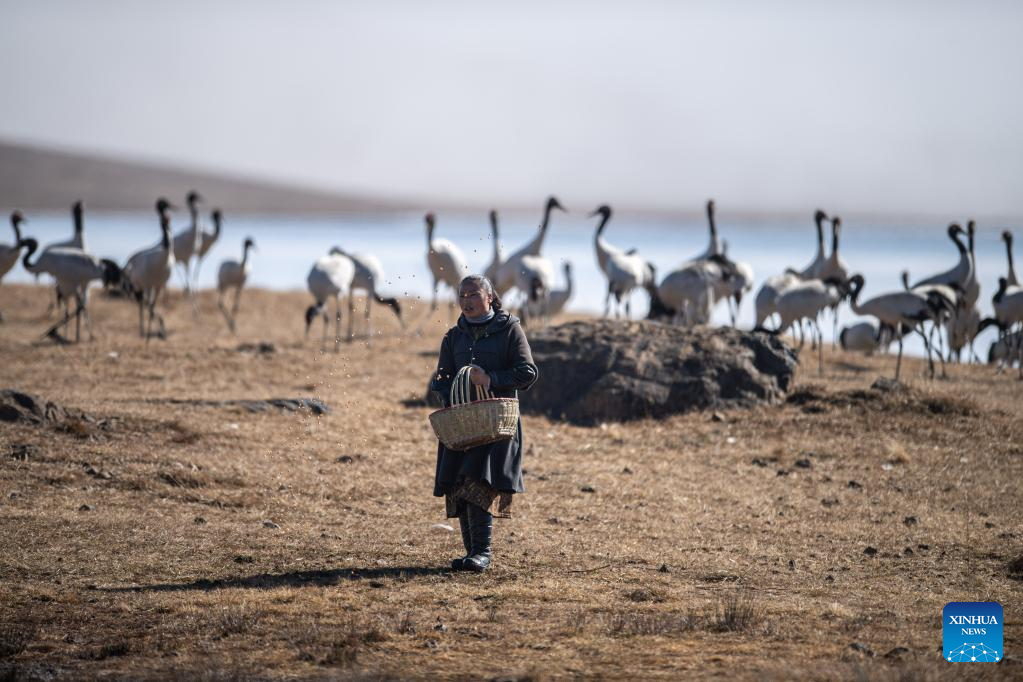
Chen Guanghui feeds black-necked cranes at Yunnan Dashanbao National Nature Reserve for Black-necked Cranes in Zhaotong, southwest China's Yunnan Province, Dec. 11, 2022. Yunnan Dashanbao National Nature Reserve for Black-necked Cranes, located in Zhaoyang District of Zhaotong City, is the most significant wintering habitat and transfer station for migratory black-necked cranes on the Yunnan-Guizhou Plateau. Chen Guanghui, 38, has been dedicated to the protection work of black-necked cranes at the reserve since 2003. She made a special whistle sound to communicate with the birds. Every year, once the black-necked cranes flock to the reserve during their migration, Chen spends hours every day feeding the birds, observing their activities and patrolling. "I regard black-necked cranes as my family," said Chen Guanghui. "I feel a deep sense of loss when they leave in the spring." Over recent years, the reserve has made a determined effort to implement conservation measures, such as wetland protection and restoration and construction of food source bases, in order to steadily improve its ecological environment for migratory birds. During the past three years, an average of over 1,500 black-necked cranes were spotted arriving at the reserve for wintering. (Xinhua/Wang Guansen) 
Black-necked cranes are pictured at Yunnan Dashanbao National Nature Reserve for Black-necked Cranes in Zhaotong, southwest China's Yunnan Province, Dec. 11, 2022. Yunnan Dashanbao National Nature Reserve for Black-necked Cranes, located in Zhaoyang District of Zhaotong City, is the most significant wintering habitat and transfer station for migratory black-necked cranes on the Yunnan-Guizhou Plateau. Chen Guanghui, 38, has been dedicated to the protection work of black-necked cranes at the reserve since 2003. She made a special whistle sound to communicate with the birds. Every year, once the black-necked cranes flock to the reserve during their migration, Chen spends hours every day feeding the birds, observing their activities and patrolling. "I regard black-necked cranes as my family," said Chen Guanghui. "I feel a deep sense of loss when they leave in the spring." Over recent years, the reserve has made a determined effort to implement conservation measures, such as wetland protection and restoration and construction of food source bases, in order to steadily improve its ecological environment for migratory birds. During the past three years, an average of over 1,500 black-necked cranes were spotted arriving at the reserve for wintering. (Xinhua/Cao Mengyao) 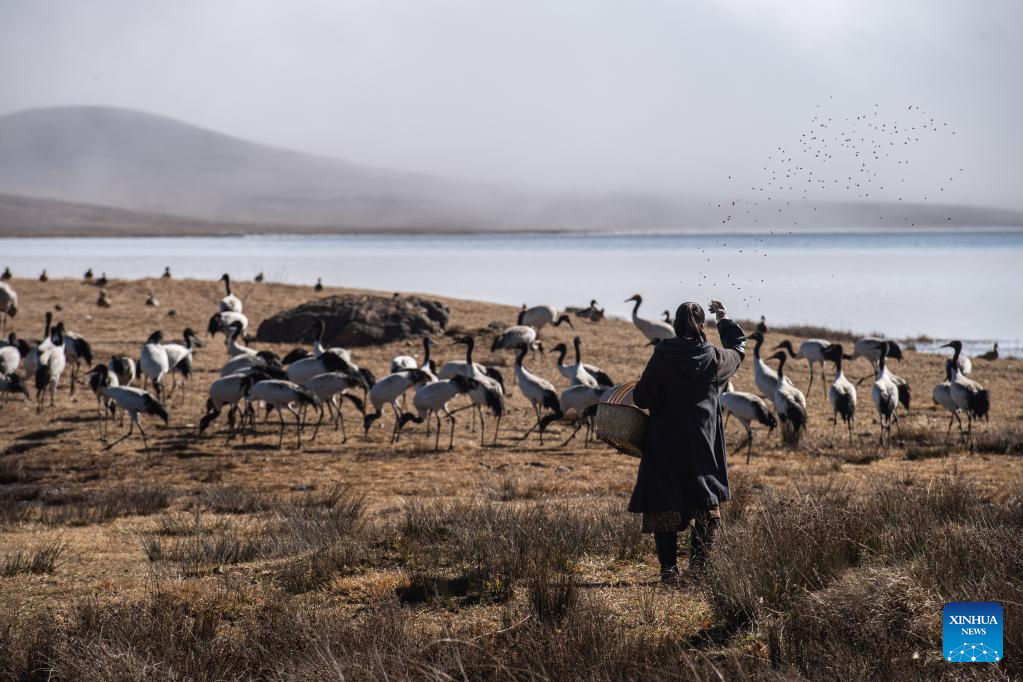
Chen Guanghui feeds black-necked cranes at Yunnan Dashanbao National Nature Reserve for Black-necked Cranes in Zhaotong, southwest China's Yunnan Province, Dec. 11, 2022. Yunnan Dashanbao National Nature Reserve for Black-necked Cranes, located in Zhaoyang District of Zhaotong City, is the most significant wintering habitat and transfer station for migratory black-necked cranes on the Yunnan-Guizhou Plateau. Chen Guanghui, 38, has been dedicated to the protection work of black-necked cranes at the reserve since 2003. She made a special whistle sound to communicate with the birds. Every year, once the black-necked cranes flock to the reserve during their migration, Chen spends hours every day feeding the birds, observing their activities and patrolling. "I regard black-necked cranes as my family," said Chen Guanghui. "I feel a deep sense of loss when they leave in the spring." Over recent years, the reserve has made a determined effort to implement conservation measures, such as wetland protection and restoration and construction of food source bases, in order to steadily improve its ecological environment for migratory birds. During the past three years, an average of over 1,500 black-necked cranes were spotted arriving at the reserve for wintering. (Xinhua/Wang Guansen) 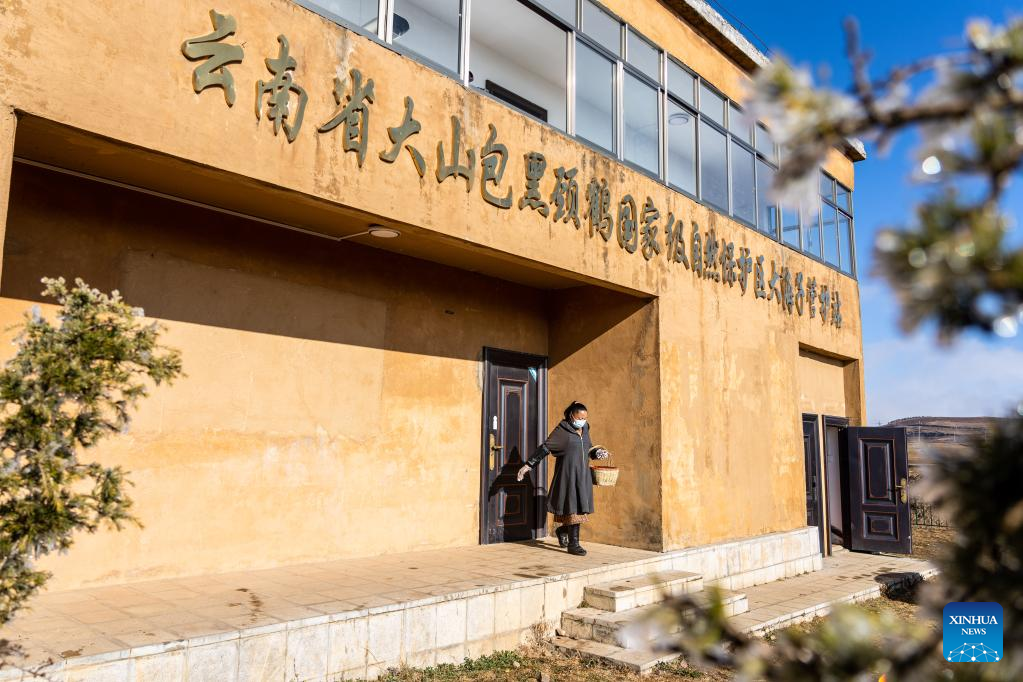
Chen Guanghui prepares to feed black-necked cranes at Yunnan Dashanbao National Nature Reserve for Black-necked Cranes in Zhaotong, southwest China's Yunnan Province, Dec. 11, 2022. Yunnan Dashanbao National Nature Reserve for Black-necked Cranes, located in Zhaoyang District of Zhaotong City, is the most significant wintering habitat and transfer station for migratory black-necked cranes on the Yunnan-Guizhou Plateau. Chen Guanghui, 38, has been dedicated to the protection work of black-necked cranes at the reserve since 2003. She made a special whistle sound to communicate with the birds. Every year, once the black-necked cranes flock to the reserve during their migration, Chen spends hours every day feeding the birds, observing their activities and patrolling. "I regard black-necked cranes as my family," said Chen Guanghui. "I feel a deep sense of loss when they leave in the spring." Over recent years, the reserve has made a determined effort to implement conservation measures, such as wetland protection and restoration and construction of food source bases, in order to steadily improve its ecological environment for migratory birds. During the past three years, an average of over 1,500 black-necked cranes were spotted arriving at the reserve for wintering. (Xinhua/Cao Mengyao) 
Birds lovers observe black-necked cranes at Yunnan Dashanbao National Nature Reserve for Black-necked Cranes in Zhaotong, southwest China's Yunnan Province, Dec. 10, 2022. Yunnan Dashanbao National Nature Reserve for Black-necked Cranes, located in Zhaoyang District of Zhaotong City, is the most significant wintering habitat and transfer station for migratory black-necked cranes on the Yunnan-Guizhou Plateau. Chen Guanghui, 38, has been dedicated to the protection work of black-necked cranes at the reserve since 2003. She made a special whistle sound to communicate with the birds. Every year, once the black-necked cranes flock to the reserve during their migration, Chen spends hours every day feeding the birds, observing their activities and patrolling. "I regard black-necked cranes as my family," said Chen Guanghui. "I feel a deep sense of loss when they leave in the spring." Over recent years, the reserve has made a determined effort to implement conservation measures, such as wetland protection and restoration and construction of food source bases, in order to steadily improve its ecological environment for migratory birds. During the past three years, an average of over 1,500 black-necked cranes were spotted arriving at the reserve for wintering. (Xinhua/Cao Mengyao) 
Chen Guanghui prepares to feed black-necked cranes at Yunnan Dashanbao National Nature Reserve for Black-necked Cranes in Zhaotong, southwest China's Yunnan Province, Dec. 10, 2022. Yunnan Dashanbao National Nature Reserve for Black-necked Cranes, located in Zhaoyang District of Zhaotong City, is the most significant wintering habitat and transfer station for migratory black-necked cranes on the Yunnan-Guizhou Plateau. Chen Guanghui, 38, has been dedicated to the protection work of black-necked cranes at the reserve since 2003. She made a special whistle sound to communicate with the birds. Every year, once the black-necked cranes flock to the reserve during their migration, Chen spends hours every day feeding the birds, observing their activities and patrolling. "I regard black-necked cranes as my family," said Chen Guanghui. "I feel a deep sense of loss when they leave in the spring." Over recent years, the reserve has made a determined effort to implement conservation measures, such as wetland protection and restoration and construction of food source bases, in order to steadily improve its ecological environment for migratory birds. During the past three years, an average of over 1,500 black-necked cranes were spotted arriving at the reserve for wintering. (Xinhua/Wang Guansen)
|